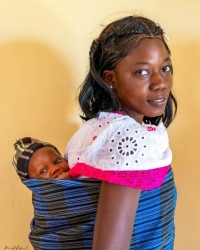Serer in Mauritania

Photo Source:
Copyrighted © 2026
Kerry Olson All rights reserved. Used with permission |
Send Joshua Project a map of this people group.
|
| People Name: | Serer |
| Country: | Mauritania |
| 10/40 Window: | Yes |
| Population: | 5,300 |
| World Population: | 1,898,300 |
| Primary Language: | Serer-Sine |
| Primary Religion: | Islam |
| Christian Adherents: | 22.00 % |
| Evangelicals: | 0.50 % |
| Scripture: | Complete Bible |
| Ministry Resources: | Yes |
| Jesus Film: | Yes |
| Audio Recordings: | Yes |
| People Cluster: | Atlantic |
| Affinity Bloc: | Sub-Saharan Peoples |
| Progress Level: |
|
Introduction / History
The ancestors of today's Serer people migrated south from the Senegal River Valley in the 11th century. From there they intermingled with the Diola people. The Serer have blended with the Diola people, but their identity as a people began in the 13th century. They have resisted the influence and domination of other religions and ethnic groups, especially the Muslim Wolof. In the 19th century there was a jihad in their region, and the Serer people repelled it. At one time the Serer people had their own kingdom. Their last king died in 1969, but he had only a figurative role at that time.
The Serer are loosely related to the Toucouleur people of Senegal. They live mostly in Senegal and Gambia, but a small number are in Mauritania.
What Are Their Lives Like?
Serer society is built upon strong family ties and tradition. Farmers and herders, the Serer live on a subsistence basis, relying on good crop yields for a prosperous year. The men cultivate peanuts and millet for the subsistence of his family and community. After this season, the men often go to the cities to work. There is often a network of friends and family in the city for men to live with. When the growing season is over for the major crops, women plant gardens of peas, okra, onions, and tomatoes on her husband's land or a small plot of her own. She may form irrigation ditches around these plantings or carry the water to the garden herself.
While the men leave for the city to work, women stay at home caring for her family. The women work very hard, starting before daybreak preparing breakfast and working far into the evening preparing dinner and cleaning. They haul water, work in fields and care for nursing infants. They expect girls to care for their siblings while the boys work in the fields with their fathers.
Celebrations among the Serer include weddings and baby naming ceremonies. Both celebrations involve feasts and monetary gifts. The Serer enjoy song and dance, and they do not limit these activities to special occasions. Funerals are a process that starts when a person dies. Wailing and mourning continues until the burial. A month later the community provides a feast for the friends and family of the deceased.
What Are Their Beliefs?
Most Serer people adhere to traditional beliefs while some have converted to Islam. Others are Roman Catholic. The Serer have been very gradual in accepting religions outside of their traditional beliefs. Even though people claim to have accepted Islam, they still hold to many traditional beliefs. Combining these two systems of beliefs is called folk Islam.
All systems of belief among the Serer include a type of charm. The Muslims wear a picture of a Marabou (a holy Islamic man) and a portion of Koranic scripture in their charm. They believe the charm has power to bless the wearer. Catholic believers wear a necklace with a picture of Christ or a Diocese in their charm. Animists wear a charm with a bone, shell or dried portion of an animal or ancestor who died long ago.
There is little isolation or persecution of those who turn from traditional beliefs. This might give them the freedom to find Jesus Christ, who is the way, the truth and the life.
What Are Their Needs?
The Serer people need better medical facilities. They also need the chance to hear that Jesus Christ can provide for all their spiritual needs.
Prayer Points
Pray for an abundant harvest for these farmers as a testimony of God's goodness and love.
Pray that the Serer may find the true freedom in Christ.
Pray for a powerful movement to Christ among the Serer people.
Pray for a spiritual hunger that will lead the Serer people to the cross and the empty grave.